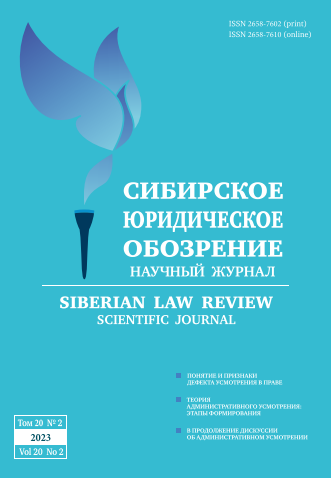The Concept and Criteria of Insignificance of the Committed Administrative Offense
- Autores: Popov A.V.1, Fomina I.A.2
-
Afiliações:
- Federal Tax Service
- Department of Federal Tax Service in the Ryazan region
- Edição: Volume 20, Nº 2 (2023)
- Páginas: 132-144
- Seção: PUBLIC LEGAL (STATE LEGAL) SCIENCES
- ##submission.datePublished##: 07.07.2023
- URL: https://journal-vniispk.ru/2658-7602/article/view/349075
- DOI: https://doi.org/10.19073/2658-7602-2023-20-2-132-144
- EDN: https://elibrary.ru/SUAATC
- ID: 349075
Citar
Texto integral
Resumo
The problem of applying the insignificance of administrative offenses is relevant in the scientific community. Many authors, such as Yu. P. Solovey, E. V. Sergeeva, O. V. Derbina, L. Ch. Kupeeva and others, in different years raised issues related to the insignificance of offenses in their scientific activities. The Authors studied the objectivity of the application of insignificance to the formal elements of offenses, the effectiveness of oral remarks, and possible criteria for recognizing an offense as insignificant. The appraisal of the concepts enshrined in the Code of Administrative Offenses of the Russian Federation (hereinafter referred to as the Code of Administrative Offenses of the Russian Federation) makes it possible to ensure the flexibility of legislation in sentencing. However, in the particular case under consideration, evaluativeness and the lack of clear criteria for the use of insignificance contribute to the blurring of the boundaries of responsibility. The results of the statistical study cited by the Authors show that for 2019-2021. a significant number of proceedings on administrative offenses were terminated precisely on the basis of Art. 2.9 of the Code of the Russian Federation on Administrative Offenses, which indicates the importance of the criteria by which the possibility of applying insignificance and the conditions to be analyzed by an official of the relevant administrative body or a judge is assessed. As a criterion of insignificance of administrative offenses, the objective side of which is characterized by the receipt of income or damage, the Authors propose to use the amount of such income or damage. According to the Authors, the classification of an administrative tort as insignificant is possible when receiving income or causing damage that does not exceed 1/30 of the subsistence minimum in the whole of the Russian Federation per capita, provided for the calendar year in which the administrative offense was committed (for 2023 - 480 rubles). Given the above, the Authors indicate the need for legislative consolidation of the categories of administrative offenses and circumstances in the commission or occurrence of which the application of the legal institution of insignificance is unacceptable. One of these circumstances, at the suggestion of the Authors, is the absence of a person held liable when considering a case of an administrative offense.
Sobre autores
Aleksei Popov
Federal Tax Service
Autor responsável pela correspondência
Email: a_popov55@bk.ru
ORCID ID: 0000-0003-2374-5382
Código SPIN: 5761-1269
Deputy Head of the HR-Department, Candidate of Legal Sci- ences
Rússia, 23 Neglinnaya st., Moscow, 127381Irina Fomina
Department of Federal Tax Service in the Ryazan region
Email: venera-1210@mail.ru
ORCID ID: 0009-0007-6657-2975
Deputy Head of the Pre-Trial Settlement of Tax Disputes
Rússia, 5 Zavrazhnova pas- sage, Ryazan, 390013Bibliografia
- Solovey Yu. P. About the Legislative Definition of the Concept of Administrative Offence. The Topical Issues of Public Law. 2013;10:31-39. (In Russ.).
- Zaykova S. N. Problems of Recognizing the Insignificance of Administrative Offenses as Exemplified By Violations of Price Setting Procedures. Administrative Law and Procedure. 2016;2:30-33. (In Russ.).
- Sergeeva E. V. Qualification of an Administrative Offense as of Little Significance When Carrying Out Procurements for Public and Municipal Needs. Administrative Law and Procedure. 2019;12:68-70. (In Russ.).
- Abduraimova R. A. Problematic Issues of Determining the Insignificance of Administrative Offenses When Bringing Legal Entities to Administrative Responsibility. Young Scientist. 2021;48:158-161. (In Russ.).
- Derbina O. V., Kupeeva L. C. Problematical Issues of Determining the Signs of the Insignificance of Administrative Offense. Institute Bulletin: Crime, Punishment, Correction. 2017;1:31-33. (In Russ.).
- Kosteva I. Application of the Provisions on Insignificance When Bringing a Customs Representative to Administrative Responsibility. Administrative Law. 2018;4:97-102. (In Russ.).
- Vinokurov V. N. Determination of Insignificance of an Act in the Aspect of Systemic Application of the Provisions of Criminal and Administrative Law. Zakonnost Journal. 2022;9:35-39. (In Russ.).
- Korsun D. Yu. General Characteristics of the Actions Which Can Be Considered Insignificant (Part 2 of Art. 14 of the Criminal Code of the Russian Federation). Vestnik of Moscow University of the Ministry of Internal Affairs of Russia. 2019;2:140-146. https://doi.org/10.24411/2073-0454-2019-10090 (In Russ.).
- Shergin A. P. Appointment of Administrative Penalties: Paradoxes of Legal Regulation. Actual Problems of Administrative Law and Process. 2018;3:72-76. (In Russ.).
- Lomakina L. A. The Notion of Insignificance of Administrative Offence in the Code of Administrative Offences of the Russian Federation. Journal of Russian Law. 2012;9:55-59. (In Russ.).
- Barakhoeva A. R. Institute of Insignificance of an Act in Administrative Legislation: Theory and Practice. Aktual’nye Problemy Teorii i Istorii Pravovoj Sistemy Obshchestva. 2020;19:106-115. (In Russ.).
- Zykina E. V., Dorokhova A. V. The Concept of Insignificance of the Administrative Offense in the Code of Administrative Offenses of the Russian Federation. In: Mission of Law. Legal Science: Traditions and Innovations. Veliky Novgorod: Yaroslav-the-Wise Novgorod State University Publ.; 2021. P. 111-119. (In Russ.).
Arquivos suplementares












